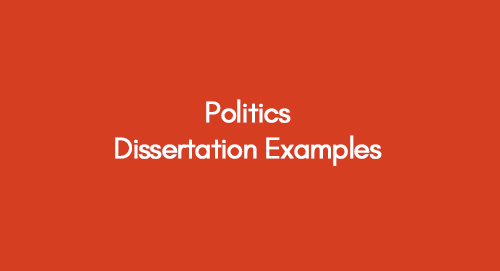
Politics Dissertation Examples | A Comprehensive Guide
December 25, 2022
135 Amazing Journalism Dissertation Topics For Students
December 26, 2022This blog post is a valuable resource for students interested in politics dissertations. It offers a general overview and a successful example for guidance, whether you're starting or already working on your dissertation, helping you understand requirements and gain inspiration.
- Politics dissertation example 1: How National Planning Policy Framework (NPPF) Can Contribute to Creating a Sustainable and Healthy Community
- Politics dissertation example 2: Analyzing the Root Causes which Often Lead to Violent Conflicts: A Case of Developing Countries
Politics papers are an important form of communication in the world of academia and politics. They are used to communicate information, decisions, ideas, and opinions on various topics. It is essential that these papers include accurate data and valid evidence to support the claims made. So, what kind of data should be included in a politics dissertation?
Get 3+ Free Custom Topics within 24 hours;
Data Sources for Your Politics Dissertation
Doing research for political dissertation research can be done in various ways. Check this blog for rightly choosing the right data sources for your politics dissertation.
Primary Sources
Primary sources are documents or records created at the time under study. These can include diaries, letters, eyewitness accounts, interviews, speeches, government documents, and statistical data. When researching a political topic, primary sources are very helpful in understanding different perspectives on the issue.
Secondary Sources
Secondary sources provide critical analysis or interpretation of primary sources or other secondary sources. Examples include books, magazine articles, encyclopedias, and journal articles written by experts on the topic being studied. These sources provide an overview of the topic and research from reliable sources that can inform your argument or opinion about it.
Statistical Data
Statistics provide quantitative information about an event or process that can help provide context for your paper’s argument and can help make sure you stay on point with your claims and opinions regarding the subject matter you’re researching. When using statistics in a political dissertation, it is important to make sure they are from reliable sources such as governmental agencies or published studies from renowned universities and organizations with expertise in the field being discussed.
Public Opinion Polls
One of the most critical pieces of data when writing a paper on politics should come from public opinion polls. These polls provide invaluable insight into how the population feels about a particular issue or policy. Understanding this information allows you to draw conclusions and make arguments based on facts rather than opinions.
However, it’s important to remember that not all polls are created equal; some may have more reliable results than others, depending on their methodologies. When using public opinion polls, be sure to include only those that reputable organizations with sound practices conduct.
Economic Data
Another type of data that should be included in political papers is economic data. It includes things like GDP growth rates, unemployment figures, inflation rates, and other economic metrics. Economic performance is often used to indicate how well a government is performing its duties; thus, it’s important to include these metrics in any political paper you write.
Additionally, this type of data can also help support or refute arguments made in your paper regarding the effectiveness of various policies or programs implemented by governing bodies.
Historical Context
Finally, a key component of any politics dissertation should include historical context. That means looking back at past events and drawing parallels between those events and the current issues discussed in the paper.
Doing so allows readers to see how certain topics have evolved and provides evidence for why certain decisions have been made or why certain policies have been implemented (or not). It also provides context for potential solutions or alternative approaches that could potentially solve current problems being discussed in your paper.
Structuring Your Politics Dissertation Data
Data Formatting Tips
When formatting your dissertation data, there are several key points to keep in mind.
- First, you should cite your sources properly and include references for each source. It helps lend credibility and validity to your work and avoids plagiarism.
- Second, it is important to ensure that all of the data is organized in an easy-to-understand way so that readers can quickly grasp the main points without having to sift through pages of text.
- Finally, ensure that all the data is clearly labeled and easy to locate within the document.
Organizing Your Data
Once you’ve formulated your research question(s), it’s time to begin organizing your data into logical categories by topic or theme. Start by identifying major themes or topics related to your research questions and break them down into smaller sub-themes or categories as necessary. These categories can then be further broken down into specific topics related to the original research question(s).
As you organize this information, be sure to create supporting evidence for each point by citing reputable sources from peer-reviewed journals or other reliable sources such as government documents or news reports. It will help strengthen your argument and demonstrate that you have thoroughly researched the topic at hand.
Analyzing Your Data
When analyzing your data, it’s important to consider how different pieces of information fit together and how they may support or contradict one another. It is also helpful to consider any underlying assumptions or biases present in the data being analyzed to identify any potential flaws or inaccuracies in the presented argument.
When writing up this analysis section of your paper, try using visual aids such as graphs, tables, and diagrams whenever possible – these can help communicate complex ideas clearly while also helping readers better understand what is being discussed.
How to Structure Politics Dissertation?
Here are some tips on how to structure your politics dissertation.
Understand Your Requirements
Before you start writing, it is essential that you understand what is expected of you by your professor or university. Pay close attention to instructions or guidelines they provide, such as word count, formatting style, etc. It will help ensure that your dissertation meets all its requirements and expectations.
Choose a Topic
Once you understand what is required, it's time to choose a topic for your dissertation. Consider topics that are relevant to current events or issues in politics. You may also want to think about topics that haven't been explored thoroughly yet by other researchers—this could give you an opportunity to make an original contribution to the field of political science.
Research and Develop Your Argument
Now that you've chosen your topic, it's time to start researching! Make sure you use reliable sources—such as scholarly journals and books—and take detailed notes so that everything is organized clearly in front of you when it comes time to write your dissertation.
Once you have gathered enough information on the topic, begin developing your argument or thesis statement for the paper—this should be one clear sentence that summarizes what position or conclusion your paper will reach by the end.
Create an Outline
Once you have developed your argument or thesis statement, create an outline for how each section of your paper will flow logically from one paragraph to the next until it all culminates with a conclusion supporting your thesis statement from earlier in the paper.
This outline should include each section's main points and arguments and any evidence or research data that backs them up (such as quotes from experts). This outline will serve as a roadmap for when it comes time to write out each section of your dissertation in full sentences and paragraphs.
Write Your Dissertation
Now that all the preliminary work has been done—you know what's required of you, have chosen an interesting topic, gathered research materials, and developed an outline—it's finally time to begin writing out each section of your dissertation!
Start with an engaging introduction that introduces readers to both the main points/arguments that will be discussed throughout the paper as well as provides background information on why this particular topic was chosen for discussion in this particular piece of writing (you can also include some personal reflections here if applicable).
Then move on to each body paragraph, where specific points/arguments are discussed more deeply before concluding with a strong conclusion.
Conclusion
In conclusion, when writing a politics dissertation, using accurate data and valid evidence to support your claims and opinions about the topic being discussed is important. All these resources should be used together to create an informed opinion based on facts rather than just conjecture or opinion alone. Doing so will ensure that your dissertation is taken seriously by academics and those working in politics!
You may Contact Premier Dissertations for a stellar politics dissertation or politics dissertation examples.
More resources on politics dissertation section writing are shared below.
Get an Immediate Response
Discuss your custom requirements with our writers
Free Online Plagiarism Checker For Students
We will email you the report within 24 hours.
Upload your file for free plagiarism


























